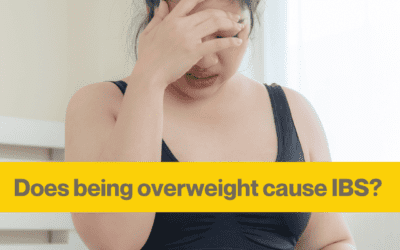Unsure if you’ve got IBS? You’re not alone, many of my clients are confused about their digestive symptoms and are looking for IBS testing.
I’m an IBS nutritionist and I’ve written this overview of the symptoms, testing and treatment for IBS to give you a few areas to think about as you attempt to get a diagnosis.
What are the signs of IBS?
The issue with diagnosing IBS is that it can be different for everyone.
Most people with IBS experience stomach cramps, bloating, abdominal pain and you might react to certain foods you eat.
One of the key symptoms is changes in bowel habits, and experiencing either recurrent constipation, diarrhoea, or a mixture of both.
IBS can also be strongly linked to mental health through the gut brain axis, so your mood can be affected as well.

IBS testing in the NHS
Have you been to your doctor yet? If you have changes in your bowel habits it’s important to visit your doctor and get checked out.
Your GP will look at something called the Rome IV criteria to diagnose you with IBS. This is a set of criteria they check against to see if you fit the definition of irritable bowel syndrome.
They will be looking for changes in your stools over the last few months, and the frequency of your symptoms like bloating, gas, or pain.
Your doctor may also offer some blood tests to look for signs of inflammation, or check your iron levels and thyroid function.
They could refer you to a gastroenterologist to offer an endoscopy or colonoscopy to look inside the intestines.
If they suspect you might have a parasite then the doctors might run a stool sample to see if this is what could be causing your symptoms.
Ruling out other conditions
There is no IBS testing that give you a definite diagnosis, but it is very important your doctor rules out any other possible conditions as part of their investigation.
The doctor may ask you about signs like:
- blood or mucus in your stools,
- family history of illness,
- unintentional weight loss,
- changes in your bowel habits.
GPs will normally touch your tummy to feel for any unusual shapes in the abdomen.
Alternative IBS diagnoses
- Coeliac disease – It can take 13 years to get a coeliac diagnosis, and many people get a previous diagnosis of IBS. You might want to check if the doctor can screen you for this condition if you think it’s relevant. If you’re tempted to try giving up gluten to see if it helps your symptoms then I recommend getting a coeliac disease test first. This is because you need eat food containing gluten for six weeks prior to a coeliac disease test. If you haven’t eaten any gluten the antibodies might not be in your blood.
- Inflammatory Bowel Disease – this includes Crohn’s and Ulcerative Colitis
- Gastroenteritis or a stomach infection
- Infection with a parasite
- Low functioning thyroid, or Hypothyroidism
- Endometriosis
- Small Intestinal Bacterial Overgrowth – this is a common overlap with IBS, and I’ve written a introduction to SIBO in this post.
Don’t waste your money on a food intolerance test for IBS
It’s not recommended to get an IgG food intolerance test because these don’t work.
Food intolerances tests measure IgG antibodies, which actually are a sign of your body tolerating a food, not being intolerant to it. I’ve written more about these kinds of food sensitivity tests in this post if you’d like to read more.

Preparing to visit your doctor about IBS
You will have a very short amount of time with your doctor, so let’s get prepared to make the most of it!
Firstly, take some notes with you describing your symptoms. For example:
- How long have you been experiencing digestive symptoms?
- What triggers these symptoms?
- Does anything else happen at the same time (e.g. headaches or skin flare ups)
- How frequently do symptoms happen?
You may find it helpful to look at the Bristol Stool Chart so you are familiar with how health professionals talk about stools. It can be easier to talk about ‘Types’ rather than describing your poo if you get easily embarrassed.
And if the thought of saying all this out loud makes you feel like squirming, please don’t feel awkward about talking about your toilet habits. Doctors really have heard it all before.
Treatment approaches for IBS
If your doctor thinks IBS is the most likely cause, then what can you do about it?
Well, there is a lot you can do to support IBS symptoms with lifestyle and diet, the key is finding what works for you.
IBS shows up very differently in each person.
There are various diets that can be trialled to see what helps your symptoms. If you haven’t heard of the low FODAMP diet, then check out this beginners guide to the low FODMAP diet
As an IBS Nutritionist I can offer you a stool test which go far beyond what is offered on the NHS. I don’t do these with all my clients, but they can be very useful. These tests will analyse all the microbes in your gut looking for dysbiosis (unhelpful bacteria overgrowth).
A private stool test will also give us some markers into the health of your intestines. It looks at your levels of digestive enzymes, as well as test for pathogenic (bad) bacteria, overgrowths of yeast like candida, or blood in your stool.
When I work with clients as part of the Gut Reset I look at your digestive symptoms as one part of your overall health. I will also investigate your skin, hormones, lifestyle, stress levels and sleep to get a good picture of what might be going on for you.
If you want to start a personalised nutrition plan for IBS you can contact me to make an appointment – info@goodnessme-nutrition.com. I’d love to hear from you, and we can set up a time for a conversation to see what you need.

IBS Nutritionist
Hi, I'm Anna Mapson, registered Nutritional Therapist.
I help people with IBS and SIBO get control of unpredictable gut symptoms to find long term relief from painful and embarrassing IBS without restrictive dieting.
I can help you to:
- understand your digestion better, so you recognise your triggers
- eat a well balanced diet, with tasty meals that are simple to prepare
- reintroduce your trigger foods so you can get back to enjoying food again
Find more about my 3 month 1:1 Gut Reset programme.
Does being overweight cause IBS?
I'm getting straight to the point with this one - There isn't any evidence that being a heavier weight causes IBS. But, what we eat, and the way food moves through the body can impact our body size, and can also affect digestive symptoms like bloating, gas, diarrhoea...
Gut Reset method – IBS nutrition support
This post gives you an overview of what you might expect in the 3 month Gut Reset programme. I use a comprehensive model for supporting IBS and gut health which has been tried and tested with hundreds of clients. True gut health incorporates food, lifestyle and...
IBS and periods: What you need to know
If you have IBS and periods you’ve probably experienced changes in your bowel habits through the menstrual cycle. You might be wondering whether you can do anything about worsening of IBS around your period. In this post I’m explaining why we get period poos, why you...




